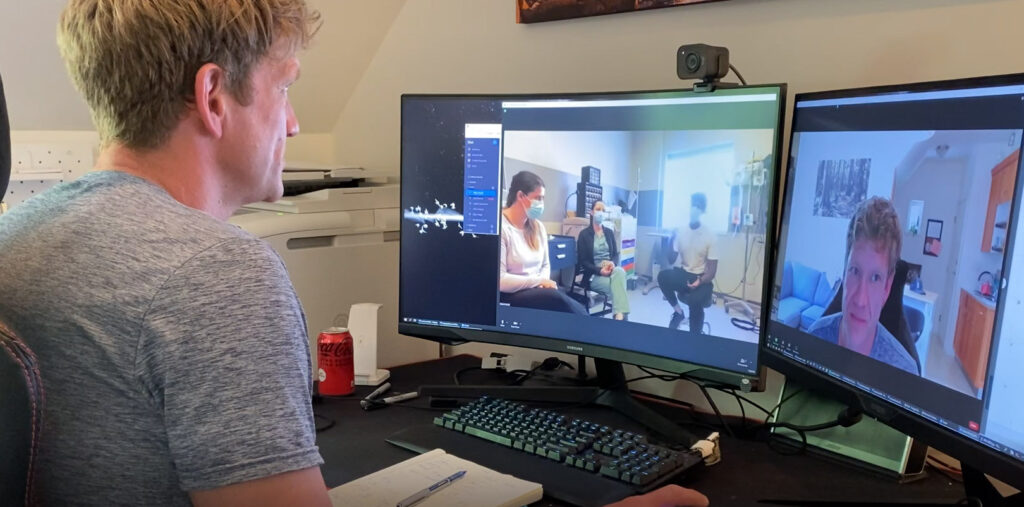An innovative collaboration between Real-Time Virtual Support (RTVS), Northern Health and on-the-ground nurses and physicians is supporting the stability of care in Fort Nelson.
The work being carried out has the potential to become a model for more sustainable healthcare delivery in other rural, remote and Indigenous communities.
The collaboration sees an RTVS RUDi emergency doctor providing Most Responsible Provider (MRP) coverage for an Emergency Room over Zoom. The in-community physician is also available but only needs to be called in for high acuity cases and can get the rest they need.
The collaboration has also seen a fifth-year FRCP Emergency Medicine Resident Physician provide healthcare in the community with the support of an RTVS RUDi emergency doctor over Zoom. The in-community doctor is also available.

The work makes it possible for:
- local doctors to get some rest and much-needed time off;
- Resident Physicians to get some hands-on training while being supported by an experienced physician; and
- rural communities with a small number of providers to have increased healthcare stability.
Dr. John Pawlovich, the virtual health lead for the Rural Coordination Centre of BC, which administers the RTVS peer support program, said he was really excited about the potential of the work. “There are rural providers all over the province who are in a position of having a call-burden that is unsustainable,” he said. “This strategy creates support to help dilute call burden, build capacity and build collegial atmosphere.”
Since April 2020, rural providers in BC (physicians, midwives, residents, nurse practitioners, nurses and, in some cases, first responders) have been able to connect with on-call RTVS peer support physicians at the click of a button. The MRP work—which allows the ordering of medication, for example, without having to call in the in-community doctors—in Fort Nelson has been an evolution of the service.
“I think one of the scariest things is just being alone with the emergency department sign over top of your head, and not knowing what’s going to come in. For people who have less training in critical care, it’s certainly a scary experience. But knowing that you can call someone, at least have someone walk you through stuff, and being there for support, and being a second set of eyes, is super useful. It also, I’m sure, provides some comfort to the people locally, especially the nurses.”
Dr. Sean Patrick
Dr. Ioana Lupu, a physician in Fort Nelson, said the collaboration had made a big difference. She said the physicians who work in the community were very relieved.
“They were very reassured to know there was someone else (for the resident or nurses to call). Doing a weekend on-call is really hard. Being assured you’re going to get some sleep, not guaranteed but a good assurance, I think recruitment wise, it’s going to make it very beneficial. The weekdays can be brutal if we have to do back-to-back nights.
“Even having one of the many, many days that you cover, with a chance you will get sleep is a big improvement.”
Dr Chris Fourie described his recent experience with having fifth-year Resident Physician Dr. Sean Patrick on site. Dr. Fourie said: “That weekend I was the only doctor in town. The day he arrived, even though Dr. Patrick wasn’t on call or expected to work during the day, it was reassuring to have such a well-qualified doctor in town.
“If there was a major problem needing more hands, I knew he was here. Just subconsciously that made a huge difference.”
Dr. Nathan Ashmead, RUDi physician, provided virtual preceptor oversight for Dr. Patrick to practice independently in this community. “It was incredible to hear so many positive feedback points that emerged in the post-rotation interviews including multiple nurses commenting on the bi-directional learning observed between Dr. Fourie and Dr. Patrick,” he said.
“When you pair the pragmatic, rurally focused approach of an experienced physician like Dr. Fourie with the academics of a freshly trained yet inexperienced FRCP resident, the knowledge translation can have a huge, positive impact.”
Dr. Patrick, who lives in Victoria, said it was really interesting to work in a rural setting and to experience a rural emergency department first-hand. He said RUDi and the other RTVS lines were ground-breaking. “It totally opens the doors for people being able to cover these remote emergency departments, and have that support,” he said.
“I think one of the scariest things is just being alone with the emergency department sign over top of your head, and not knowing what’s going to come in. For people who have less training in critical care, it’s certainly a scary experience. But knowing that you can call someone, at least have someone walk you through stuff, and being there for support, and being a second set of eyes, is super useful. It also, I’m sure, provides some comfort to the people locally, especially the nurses,” he added.